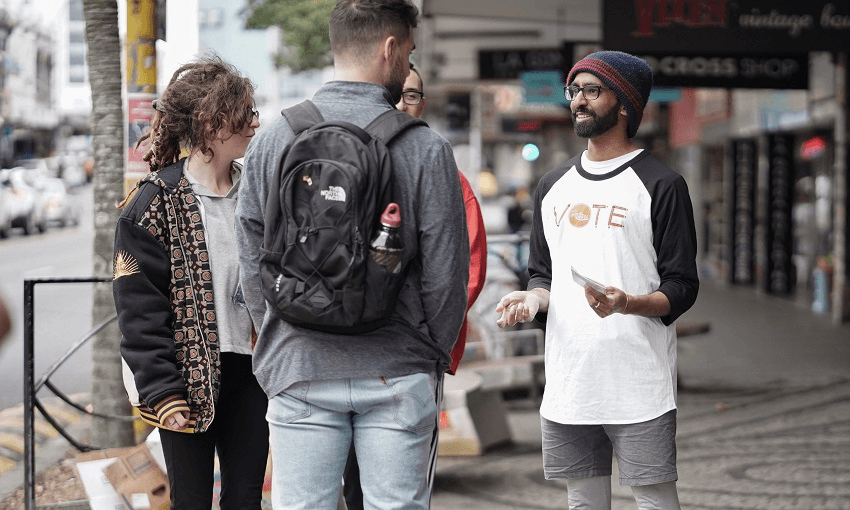The design of our cities can help shape our mental health. Lucy McLean puts out a call to vote for the politicians who’ll build a city where people feel more connected to community.
The Spinoff local election coverage is made possible thanks to The Spinoff Members. For more about becoming a member and supporting The Spinoff’s journalism click here.
At my loneliest moment in Auckland, I went for a walk around Westhaven. At dusk, you can see the lights there, of houses, of the CBD, of the ever-glowing stream of traffic crossing over to the North Shore, and of the headlamps on the fishermen trying their luck.
For a second I blamed myself for feeling so isolated: How is it possible to feel lonely in a city surrounded by 1.7 million others? I quickly retracted, I knew for a fact I wasn’t the only one.
I spend a decent chunk of every week on Lifeline as a counsellor. We are a national crisis helpline but, given the fact that Auckland’s population is as big as the 12 next biggest cities and towns combined, a large proportion of our calls are local. Every day we are responding to crises, but also every day we are a place people can call when they are feeling some of the same loneliness I felt on that walk.
Helplines often act as an interface between communities and further professional support. Through my work, I’ve collected countless stories from people with experience of New Zealand’s District Health Boards (DHBs). And what I know is that DHBs operate differently depending on where you live. This means what is available to people in a time of mental health crisis, or how long a person has to wait before seeing a psychiatrist, really depends on your local DHB. This local variation isn’t a bad thing necessarily; DHBs are meant to be sensitive to the needs of the people in their community. But in order to reflect our needs, communities – and especially young people – have to vote.
In the lead up to the local elections, RockEnrol ran a survey for 18 to 35-year-olds in Auckland. Of our 1,400 respondents, 80% said health (mental and physical) was a local election issue they cared about. In fact it was second only to transport at 81%. These results shine a light on a local election topic that too often gets swept to the side.
I’m not surprised it ranked highly. I know this is something we care about and I also know that many of my peers aren’t getting what they need for good mental health.
It makes sense to vote for DHB candidates who will represent us and influence DHB policy and spending around mental health. Our collective wellbeing is also a local election issue when it comes to voting for mayor, councillors, and local board members. There is a sad international trend towards increased rates of loneliness in urban settings, but this doesn’t have to be the case. These local elections are an opportunity to stop and imagine the kind of place that we want to live in. For me my dream city is social and covered in art, it’s a place where people value sacred sites and equity, and one where every second person cycles (lol).
In ActionStation’s research on youth wellbeing, young people spoke about their desire for community spaces that connected them to people not just their own age but across generations. In our survey, we asked young Aucklanders what their ideal neighbourhood looked like and the words ‘community’ and ‘friendly’ were amongst those that came up most often.
Despite it being clear to me that we all care about the issues that will be impacted by the results of this year’s local election, I know that the link between the issues we care about and local government is unclear. In that same ActionStation survey, young people also said they didn’t know how to change things they didn’t like in their local community.
Sitting at home filling out a confusing form hardly connects us to the wellbeing of the collective. One of RockEnrol’s missions is to make voting less lonely and more social, which is why in my work as the Auckland election campaign coordinator, we have a focus of bringing voting into public spaces. Last week, we hosted a stall in St Kevin’s Arcade on Karangahape Road where people could enrol and vote at the same time. Volunteers pulled people in off the street to invite them to have their say in our collective future.
This Friday, we’re hosting Democracy Dumplings where people can enrol and vote at the same time in the Auckland University Quad and then eat delicious dumplings with friends and strangers. The event is open to anyone living in Tāmaki Makaurau and it’s designed to reduce the barriers to voting, such as figuring out where your local postbox is while also modelling the more connected and vibrant city we want Auckland to be.
We all have a story: one way to tell it is to vote. From your local counsellor-turned-council campaigner, go tell em what you want.
Lucy McLean is the Auckland Local Election Campaign Coordinator for RockEnrol and a crisis/helpline counsellor for Lifeline. She is 24 years old and talks about how much she loves her bike almost as much as she rides it.
The Spinoff local election coverage is made possible thanks to The Spinoff Members. For more about becoming a member and supporting The Spinoff’s journalism click here.
